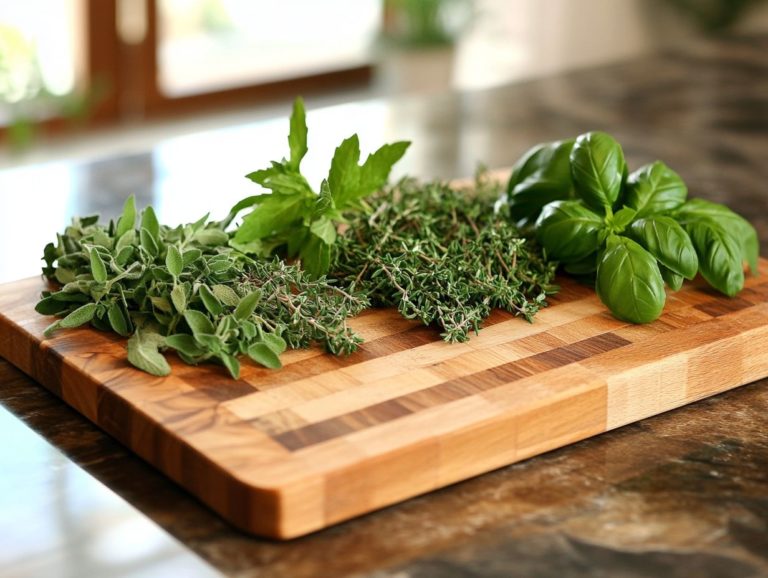5 Guidelines for Safe Herbal Dosing
Thinking about herbal medicine? You re certainly not alone. With the growing interest in natural remedies, countless individuals are discovering the advantages of herbal supplements.
Knowing how to use them safely is essential. This article offers key guidelines for safe dosing, such as consulting healthcare providers, starting with smaller doses, and being mindful of potential interactions with other medications.
You ll find insights on common herbal medicines, their benefits, and tips for recognizing any adverse reactions. Explore the information to ensure your herbal journey is both effective and safe!
Contents
- Key Takeaways:
- 1. Consult with a Qualified Healthcare Professional
- 2. Start with Small Doses
- 3. Follow Recommended Dosage Instructions
- 4. Be Aware of Potential Interactions with Medications
- 5. Monitor for Any Adverse Reactions
- What Are the Benefits of Herbal Medicine?
- Frequently Asked Questions
- What are the 5 Guidelines for Safe Herbal Dosing?
- What is the correct dosage for herbal supplements?
- What are potential side effects and interactions of herbal supplements?
- Is it necessary to consult with a healthcare professional before taking herbal supplements?
- Why is it important to start with a low dose when taking herbal supplements?
- Can herbal supplements be harmful if taken incorrectly?
Key Takeaways:

1. Consult with a Qualified Healthcare Professional
Before you start any herbal supplementation journey, it’s essential to consult with a qualified healthcare professional, like a naturopathic provider (a doctor specializing in natural medicine) or herbalist (a specialist in herbal remedies). They can guide you to make informed choices that match your unique health needs.
These experts assess the potential benefits and risks of various herbal products, considering your health conditions and any medications you take. Their insights help you navigate the sometimes confusing world of herbal remedies, ensuring your choices align with evidence-based practices.
While the FDA doesn’t regulate herbal supplements as strictly as pharmaceuticals, understanding clinical trials and scientific research is crucial when evaluating quality and effectiveness. To enhance your knowledge, be aware of the 5 common herbal dosage mistakes to avoid. This approach enables you to make safe and informed decisions, maximizing the benefits of your herbal supplements.
2. Start with Small Doses
When you begin a regimen of herbal supplements, starting with small doses is essential. This approach allows you to gauge your body s response to the herbal formula based on your weight and age.
This careful introduction lets you assess your personal tolerance levels without overwhelming your system. By monitoring how you feel after each dose, you can pinpoint the supplement’s effectiveness and any potential side effects, like digestive upset or increased sensitivity.
Adjusting dosages should account for your individual health factors, including any pre-existing conditions. This way, you can proceed cautiously and incrementally.
By adhering to these personalized guidelines, you can discover the most beneficial dosage for your unique needs.
3. Follow Recommended Dosage Instructions
Following the recommended dosage instructions for herbal supplements is crucial. This helps you achieve the effective concentration required for the desired health benefits and minimizes the risk of unwanted side effects.
Sticking to these guidelines maximizes the intended benefits while safeguarding your overall health. Straying from prescribed dosages might increase your chances of side effects or reduce the supplement’s effectiveness. For more insights, check herbal safety information, as each herb has its own potency, and variations in concentration can lead to unpredictable results.
It’s essential to consult reliable sources or healthcare professionals who can guide you on proper usage, including herbal dosage guidelines for pregnant women. This way, your herbal supplement journey complements your health safely and effectively!
4. Be Aware of Potential Interactions with Medications

Be aware of potential interactions between herbal supplements and both prescription and over-the-counter medications. Communicate openly with your healthcare provider about all the supplements you re using.
Such interactions can significantly change how well your medications work. This may lead to unintended side effects or reduced therapeutic benefits. Take St. John’s Wort, for instance. It s known to interfere with various medications, including antidepressants and blood thinners. This highlights the importance of disclosing any herbal supplements to your healthcare provider.
Feel encouraged to discuss any herbal remedies, vitamins, or dietary supplements you may be considering. This proactive dialogue can prevent serious health complications.
5. Monitor for Any Adverse Reactions
Watch for any adverse reactions when using herbal supplements. You might experience side effects, ranging from mild allergies to more severe reactions that need medical attention.
Understand that herbal products, even though they come from nature, carry their own risks. Some might cause stomach problems, while others could interact with prescription medications. St. John’s Wort is notorious for affecting the effectiveness of various drugs, so exercise caution. Keeping a detailed diary of any unexpected symptoms can provide valuable insights.
Fostering open communication with your healthcare providers can make your health journey smoother. This ensures that any adverse reactions are quickly addressed.
What Are the Benefits of Herbal Medicine?
Herbal medicine offers many benefits for health conditions like cardiovascular issues, arthritis, and depression. These plant-based supplements can reduce inflammation, lower cholesterol, and uplift your mood.
For managing arthritis, herbs like turmeric and ginger are renowned for their powerful anti-inflammatory effects. If you’re grappling with depression, certain botanicals, such as St. John s Wort, have shown promising results in enhancing overall mental well-being.
Herbs like garlic and ginger also assist in cholesterol management, helping to lower unhealthy LDL levels while promoting heart health.
By incorporating herbal supplements into your daily routine, you can support your body’s natural healing processes and work proactively toward disease prevention. For more information on the right amounts, check the proper dosage for herbal teas. Take charge of your health today!
What Are the Most Commonly Used Herbal Medicines?
Some of the most commonly used herbal remedies include St. John’s wort, known for its mood-enhancing abilities, garlic for heart health, echinacea for immune support, and feverfew for managing migraines. This variety shows the impressive range of herbal supplements available to address different health conditions.
These supplements not only provide a natural pathway to wellness but also reflect centuries of traditional use, which modern scientific research is gradually validating. For instance, St. John’s wort has been extensively studied for its antidepressant properties, with clinical trials affirming its effectiveness in treating mild to moderate depression.
Garlic is celebrated for its ability to lower cholesterol and blood pressure, backed by numerous studies highlighting its heart health benefits. Echinacea is often turned to during cold and flu season, with research indicating it may bolster the immune response.
Feverfew has a rich history in traditional medicine, used to alleviate headaches. Emerging evidence suggests it may help reduce the frequency of migraines. Together, these herbal supplements exemplify the broad spectrum of herbal medicine, catering to those seeking alternative and complementary health options.
How Can One Determine the Correct Dosage for Herbal Supplements?

Determining the correct dosage for herbal supplements requires more than just a guess. It involves consulting with a healthcare provider and considering various factors such as weight-to-dose and age-to-dose recommendations to achieve optimal therapeutic effects.
Your individual health conditions are crucial here. Some medical issues may require adjustments to the standard dosages. For example, if you have a liver condition, your body might metabolize supplements differently from someone without health concerns. To ensure safety, consider referring to dosage recommendations for popular herbs.
Age plays a significant role too. Children and the elderly often have varying sensitivities to herbal products, leading to different dosage needs. For more detailed information, refer to understanding herbal dosage. The form of the supplement, whether a capsule, tincture, or powder, can also influence absorption and effectiveness.
If you seek guidance, engage with a qualified healthcare professional and use reliable resources, such as reputable educational websites or patient support groups. They can provide valuable insights for determining the most accurate dosage, including herbal remedies safe dosage for adults and children. Don’t wait to seek advice!
What Are the Possible Risks of Herbal Supplements?
Herbal supplements can provide notable health benefits, but they also come with potential risks, including side effects, allergic reactions, and interactions with other medications. This makes it essential to consult with a healthcare provider before diving in.
This step is super important! Certain herbal products may worsen existing conditions or interfere with established treatments. Take St. John’s wort, for example. It s often sought after for its mood-boosting properties but can decrease the effectiveness of specific antidepressants and contraceptive pills, possibly leading to unintended pregnancies or inadequate management of mental health issues.
Similarly, if you’re considering ginseng, be cautious about combining it with anticoagulant medications like warfarin, as it can increase the risk of bleeding. Since each herb may produce varying effects depending on your unique health status, personalized medical advice is vital for safely integrating herbal supplements into your wellness routine. For how to measure herbal dosages accurately, consult reliable resources to ensure you are using the right amounts.
How Can One Safely Combine Herbal Supplements with Conventional Medications?
To safely combine herbal supplements with conventional medications, consult your healthcare provider. They will help you understand potential interactions and ensure both treatment methods work together smoothly.
This collaborative approach is essential. Certain herbal products can affect how prescribed drugs are metabolized, potentially increasing side effects or diminishing their effectiveness. It’s also crucial to maintain open communication with your healthcare team and disclose all herbal supplements you’re taking.
Regularly monitor for any unusual symptoms or reactions, allowing you to take a proactive approach to your health. By tracking the dosage and duration of your herbal use, you can enhance safety and support healthier outcomes while blending traditional and alternative therapies. Always remember the importance of creating herbal remedies: safety tips to ensure your well-being.
What Are Some Signs of an Herbal Overdose?
Recognizing signs of an herbal overdose is vital. You might notice symptoms such as severe allergic reactions, gastrointestinal distress, or dizziness. These symptoms require immediate consultation with a healthcare provider for prompt evaluation.
You could also experience rapid heartbeat, confusion, or even fainting serious indicators of a life-threatening situation. Stay alert for any unusual reactions, especially after introducing new herbal supplements into your routine.
If you suspect an overdose, act quickly by contacting emergency services or a poison control center. Keep emergency numbers easily accessible to make a difference in critical moments. Gather any remaining herbal products for reference to ensure effective treatment measures are implemented.
Frequently Asked Questions

Here are some frequently asked questions about herbal supplements:
What are the 5 Guidelines for Safe Herbal Dosing?
The 5 Guidelines for Safe Herbal Dosing include using the correct dosage, knowing potential side effects and interactions, consulting with a healthcare professional, starting with a low dose, and gradually increasing the dose.
What is the correct dosage for herbal supplements?
The correct dosage for herbal supplements varies based on the specific herb and its intended use. Consult with a healthcare professional or follow the recommended dosage on the product label.
What are potential side effects and interactions of herbal supplements?
Herbal supplements can have side effects and interact with other medications or health conditions. It s important to research and consult a healthcare professional before taking any herbal supplements.
Is it necessary to consult with a healthcare professional before taking herbal supplements?
Yes, it is recommended to consult with a healthcare professional prior to taking herbal supplements, especially if you have underlying health conditions or are currently on other medications.
Why is it important to start with a low dose when taking herbal supplements?
Starting with a low dose allows your body to adjust to the supplement and reduces the risk of adverse reactions. If needed, the dose can be gradually increased under the guidance of a healthcare professional.
Can herbal supplements be harmful if taken incorrectly?
Yes, taking herbal supplements incorrectly or in high doses can be harmful. Always follow the recommended dosage and guidelines for safe herbal dosing.




